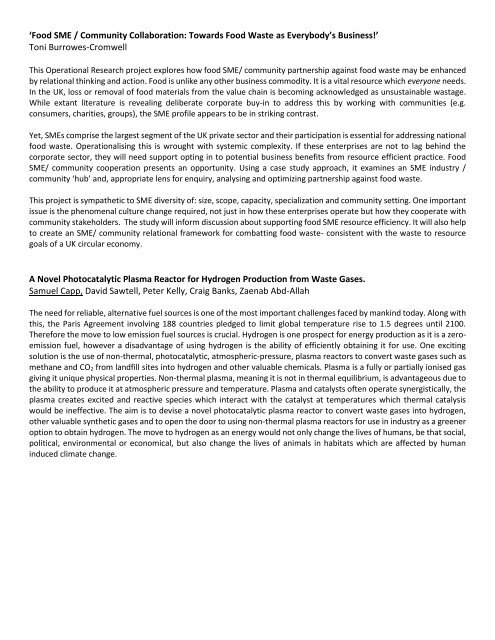Conference Programme FULL (1)
You also want an ePaper? Increase the reach of your titles
YUMPU automatically turns print PDFs into web optimized ePapers that Google loves.
‘Food SME / Community Collaboration: Towards Food Waste as Everybody’s Business!’<br />
Toni Burrowes-Cromwell<br />
This Operational Research project explores how food SME/ community partnership against food waste may be enhanced<br />
by relational thinking and action. Food is unlike any other business commodity. It is a vital resource which everyone needs.<br />
In the UK, loss or removal of food materials from the value chain is becoming acknowledged as unsustainable wastage.<br />
While extant literature is revealing deliberate corporate buy-in to address this by working with communities (e.g.<br />
consumers, charities, groups), the SME profile appears to be in striking contrast.<br />
Yet, SMEs comprise the largest segment of the UK private sector and their participation is essential for addressing national<br />
food waste. Operationalising this is wrought with systemic complexity. If these enterprises are not to lag behind the<br />
corporate sector, they will need support opting in to potential business benefits from resource efficient practice. Food<br />
SME/ community cooperation presents an opportunity. Using a case study approach, it examines an SME industry /<br />
community ‘hub’ and, appropriate lens for enquiry, analysing and optimizing partnership against food waste.<br />
This project is sympathetic to SME diversity of: size, scope, capacity, specialization and community setting. One important<br />
issue is the phenomenal culture change required, not just in how these enterprises operate but how they cooperate with<br />
community stakeholders. The study will inform discussion about supporting food SME resource efficiency. It will also help<br />
to create an SME/ community relational framework for combatting food waste- consistent with the waste to resource<br />
goals of a UK circular economy.<br />
A Novel Photocatalytic Plasma Reactor for Hydrogen Production from Waste Gases.<br />
Samuel Capp, David Sawtell, Peter Kelly, Craig Banks, Zaenab Abd-Allah<br />
The need for reliable, alternative fuel sources is one of the most important challenges faced by mankind today. Along with<br />
this, the Paris Agreement involving 188 countries pledged to limit global temperature rise to 1.5 degrees until 2100.<br />
Therefore the move to low emission fuel sources is crucial. Hydrogen is one prospect for energy production as it is a zeroemission<br />
fuel, however a disadvantage of using hydrogen is the ability of efficiently obtaining it for use. One exciting<br />
solution is the use of non-thermal, photocatalytic, atmospheric-pressure, plasma reactors to convert waste gases such as<br />
methane and CO 2 from landfill sites into hydrogen and other valuable chemicals. Plasma is a fully or partially ionised gas<br />
giving it unique physical properties. Non-thermal plasma, meaning it is not in thermal equilibrium, is advantageous due to<br />
the ability to produce it at atmospheric pressure and temperature. Plasma and catalysts often operate synergistically, the<br />
plasma creates excited and reactive species which interact with the catalyst at temperatures which thermal catalysis<br />
would be ineffective. The aim is to devise a novel photocatalytic plasma reactor to convert waste gases into hydrogen,<br />
other valuable synthetic gases and to open the door to using non-thermal plasma reactors for use in industry as a greener<br />
option to obtain hydrogen. The move to hydrogen as an energy would not only change the lives of humans, be that social,<br />
political, environmental or economical, but also change the lives of animals in habitats which are affected by human<br />
induced climate change.


